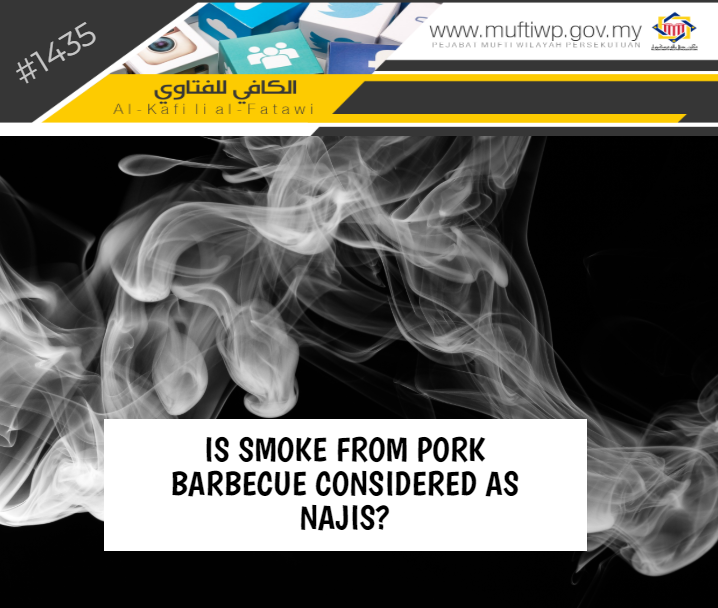Question:
Assalamualaikum SS Mufti. I walked by a Chinese restaurant and saw that one of the workers there was barbecuing a large thick red meat and the smoke from the barbecue passes through me. I’m not sure whether it is pork meat or otherwise. Is the smoke considered as najis or not? Thank you.
Answer:
Waalaikumussalam wbt,
Alhamdulillah, praise and thanks to Allah for the many countless blessings He has blessed us all with. Blessings and salutations to the Prophet Muhammad PBUH, his wives, his family, companions and all those that follow his teachings to the day of judgement.
It is generally known that dogs and swine is mughallazah najis (major najis) and it is wajib to be purified through specific methods set by syarak. Allah SWT states:
حُرِّمَتْ عَلَيْكُمُ الْمَيْتَةُ وَالدَّمُ وَلَحْمُ الْخِنزِيرِ
“Prohibited to you are dead animals, blood, the flesh of swine,”
Surah al-Maidah (3)
Dr Muhammad Zuhaili in his book state that the physical of dog or swine whether their carcass, blood, urine and others are considered as najis. (See al-Mu’tamad fi al-Fiqh al-Syafi’e, 1/47)
Smoke from Najis
Coming back to the above issue, scholars have differing opinions as to the ruling of smoke from burning of najis. This is as stated by Imam al-Nawawi in his book:
“There are two opinions regarding the smoke from the burning of najis which are: First opinion state that it is considered as najis. The reason is it is a result of najis. The second opinion states that it is not considered as najis because the smoke that comes from the burning of najis is the same as vapor that is excreted from the body.” (See al-Majmu’ syarah al-Muhazzab, 2/579)
Furthermore, jurists have differing opinions regarding smoke from the burning of najis, according to the fatwa of madhhab Hanafi, the final opinion in madhhab Maliki and some ashab of madhhab Hanbali state that smoke from najis is pure. And according to Hanafiyah ashab, this is to take the road of goodness and preventing hardship.
Moreover, the asoh opinion in madhhab Syafi’e, madhhab Hanbali, Abu Yusuf from the Hanafiyyah scholars hold the opinion that the smoke from najis is also najis the same as its origin.
Imam Ramli, a Syafi’eyyah scholar is of the opinion that if the smoke is in a small amount, then it is forgiven. Furthermore, according to the opinion of Ibnu Hajar al-Haitami it is forgiven if the smoke is not from mughallazah najis. If it from mughallazah najis, then it is not forgiven whether it is only a small amount or otherwise. (See al-Mausu’ah al-Fiqhiyyah al-Kuwaitiyyah, 20/240)
Conclusion
Coming back to the question and the evidences presented earlier, it can be concluded that according to the opinion of madhhab Imam al-Syafie, this issue is divided into several situations:
- Smoke from the burning of najis is forgiven if it is in a small amount and does not leave marks or stains on one’s clothing.
- And if there is a mark from the smoke of the burning of najis such as some stain on one’s clothing, then it is considered as najis and should be cleansed and purified.
(See al-Majmu’ Syarah al-Muhazzab, 2/579)
Furthermore, if one is uncertain whether the smoke is from najis or otherwise, then it is best to analyse it further. If there is no implication that it is najis, then it is considered as pure, this is according to an Islamic legal maxim which states:
نَحنُ نَحكُمُ بالظَوَاهِرِ واللهُ يَتَوَلَّى السَّرَائِرَ
“We determine a ruling based on the determinable matters while Allah SWT is the authority on the unknown.”
The same is stated in another maxim:
الشك لا يبنى عليه حكم
“A ruling is not built based on doubtful matter,”
May Allah SWT give us guidance in understanding His commandments and practising His shariah the best we could.


